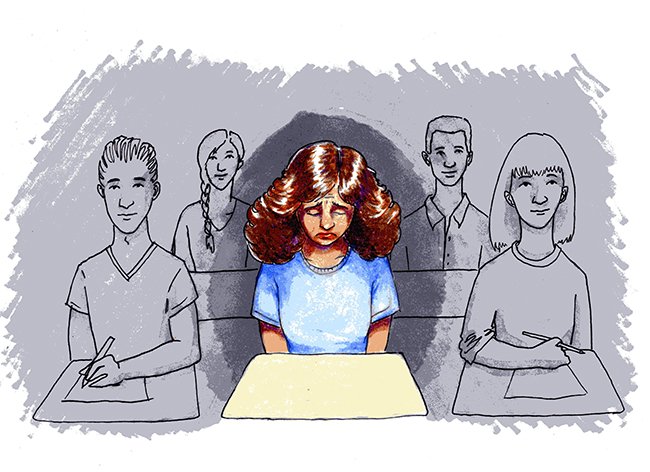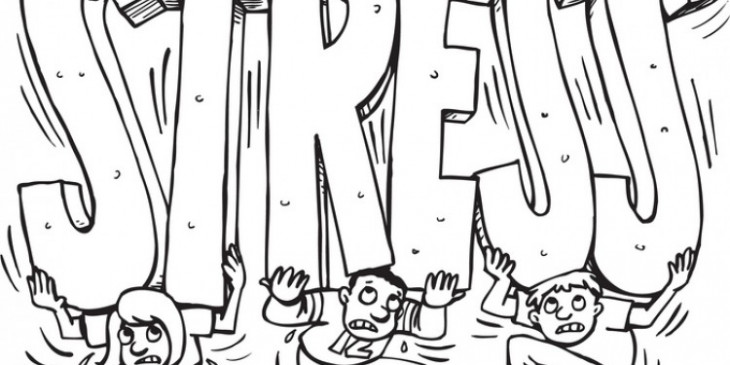When dealing with rejection, it can be easy for teens to internalize the feelings of negativity - give them the support they need and use our blog for tips on helping them cope!
COPING MECHANISMS
Adolescence being a very tender phase all together, negativity around them hampers the wellbeing of the mind in several ways and most of the times the negative phase that is encountered by the teen is not optimistically taken by the child. The most unfeigned or candid suggestions of parents are received in a cold manner by the teens. Hormonal changes that they undergo all the more triggers them to respond in hostile manner in order to curb this the child has to adapt to several coping mechanisms which would help them to head positively. Respective mechanisms are listed below:
(i) Dealing with (constructive) criticism:
Woefully even meaningful or lucrative criticisms are not reciprocated by the children, they basically respond to it with an uneven temper and that happens in the heat of the moment and post that, the baggage of those thoughts always weigh their shoulders down for the rest of the day. In such a condition finding ways to deal such a situation turns out to be a must so that even in the future the child doesn’t be vulnerable to the outside world. To tackle a situation where there stands a criticism on the way, be it constructive or not following ways can be adopted.
(ii) Avoiding spontaneous reaction:
No matter how provocative the comment would be, immediate reaction that takes place in the spur of the moment would lead to a situation from where getting out of it would be difficult. Holding immediate the reaction, halting the harsh words as response, would make the situation relatively cool to deal with. In the end spontaneous reaction would always make the situation more intense than it actually is.
(iii)Benefit from the comment:
It’s always great to seek a door for improvement although the comment might seem harsh and grating but to always see one dimension of positivity in any situation would make one feel evolved emotionally and even further, the most debilitating situation could be handled great. It’s not necessary that every feedback that comes is through an ill intention, it’s necessary to keep that in mind before having reacted to it hysterically.
(iv)Understanding only for the sake of listening:
When the immediate typical responses are kept backwards, the brain is processing in a way that all the positivity of the comment is absorbed ( high-five) to such a situation , later that indulging in a positive dialogue becomes easy where in phrases such as “ I understand your plight completely “ although understanding and agreement differ highly .
(v)Avoiding excessive analysing:
Thinking about the criticism or analysing it way too much, or involving in self-talk where the respective “criticism” plays like a tape recorder, would simply waste a lot of time and the teen would be tired on a mental level. Basically taking the criticism positively and not over assessing it is the key to deal or tackle a criticism constructively.
(vi) Thanking :
A basic thank you (which sounds tough) where looking at the individual and thanking could ease everything out , over glossing of thanking should also not take place where there is a dragging of the conversation that takes happens expressing gratitude stating that “ I appreciate your concern “ would function as a cool breeze .
DEALING WITH FAILURE AND REJECTION

Failure (the reason to bounce back)
Seeking the greatest potential is impossible with always fearing of failure that takes place in the child. The child at a very young age is pressured to excel in various ways at a very young age, the age duration of 15-19 the child is definitely exposed to the competitive world outside and expecting the child to peak in every activity is very unreasonable and irrational. There are teens that use failure to bounce back better, whereas there are going to be individuals who feel shattered and immobilized after having failed and need some mechanisms to deal with it or Ways in which failure can be dealt by the teenagers with the help of understanding of the parents are listed below:
(i)Indulging in progressive self –talk:
Drawing inappropriate conclusions such as “I am of no good”, “I can never do anything right “, are very easily drawn by the child at the time when the teen faces failure which are completely wrong, indulging in unhealthy self- talk as such would weigh down the teen not only in academics but in life as whole . Repetitive compassionate statements such as” I can do wonders “, “I am a confident person”, can on actual terms help raise the confidence of the child which would help in performing well academics or even life as whole .
(ii)Accounting or praising efforts more than the results:
This is particularly from the end of the parents where efforts of the child should be appreciated than the results. Praising the inputs by stating that “I am so proud of you”, “so hardworking my child is” are the verbal ways that act as a pat on the back. Also it is important for the child to be made to realise that active participation is what is important at the end. Parental support in such a situation would reflect that the love that the parents have for their children stays unconditional throughout.
(iii)Dealing with rejection:
Social rejection is when an individual is isolated or excluded from a social group. This phenomenon is very general in teenage group where social exclusion or rejection is faced at some or the other point of time. With respect to teens, as sensitive as they are, even the most minor rejection cannot be tolerated by them this entire feeling of refusal leads to evoking of negative emotions in them believes such as “the world is a bad place to be in “, “people are bad”, are adopted by them immediately and teens who have the sense of non-acceptance grow out to be adults who always have the feeling of self-doubt and less self –esteem , therefore the acknowledge the worth of self and to be okay with the fact that some individuals are meant to stand out rather than fitting in forcibly ,should be taking place early . Rejection can nonetheless be a very heart shattering phase to be in it can definitely be dealt with the respective firm believes:
(iv)Acknowledgement of self-worth:
It is a must to realise that the worthy of self is not in the hands of someone else. Teens are fascinated with the idea of being a part of the most attractive peer group and when felt neglected their entire morale steeps down. It is duty of the parents firstly to always accept their children as they are so the child does not feel the need to seek attention, love and respect beyond.
(v) Self- bolstering:
When felt rejected, it is vital for the child to realise that when the inner voice is generating all negative emotions it is to be channelized into a positive direction. Rewiring intrusive thoughts into positive ones is the first step towards dealing with rejection. A pep talk with the self may sound unrealistic but when done it does wonders and helps elevating the inner confidence.
Dealing with failure and rejection? Take our emotional intelligence course to learn helpful strategies for responding appropriately to these experiences!
PROCRASTINATION (foe of teens)

Procrastination is a behavioural trait where there is an avoidance of completion of any task; it also includes the act of delaying in completing any work which could mainly be any household associated chore or work related. It may most the times seem like procrastination stems out of sheer laziness but in extreme cases it may also be the result of depression, guilt or maybe low confidence or self –esteem. Procrastination is nothing but a trap and since there are more easy resources to be distracted one of the greatest examples would be the internet, most of the individuals are likely to fall into this trap but also is there a way to dodge off the problem of procrastinating or delaying activities. With respect to teens, they usually have a tendency to delay every task that they are expected to indulge in, leading to an underperformance in their academics.
The recognition of procrastination:
To be able to realise that a lot of time is been wasted and something has to be done with a situation like that is the first step towards time management (this feeling itself is good enough to begin with a fresh start). When the individual believes to understand that time is not to be wasted and it is necessary to be work driven and also it is a must for individuals from a young age to understand that THERE IS NO SUBSTITUE TO HARDWORK .
Take control of stress and anxiety in your child's life by teaching them helpful communication techniques with our self-management course!
Adapting to strategies: there are certain strategies to overcome prolonging of any task
(i)Commitment to the task:
Committing in completing the task and not avoiding should be firmly affirmed. Generating the feeling that the particular activity has to be completed no matter what is a must. Making to-do lists can help one do have an analysis of what shall be done in during the day. Children must also believe in studying right from day one and not just a day prior to the examination. Small steps taken on daily bases, help much more than making attempts to take a long leap one day prior to the exam.
(ii)The magic of “rewarding”:
Everyone deserves a pat on the back after having accomplished tasks no matter how small they are , it’s the same with teens its nothing wrong to involve in “me” time after completing any activity . Rewarding oneself to listen to some good music, read a good book, dancing on some good music, play an outdoor game can increase the likelihood of completing tasks on time provided it must be made sure that refreshment activities must not last more than few minutes.
(iii)Reality check:
Quite necessary it is to list down verbally or in a written manner to analyse that what all work (studies or anything else) has been done the entire day before hitting the bed to see how productive the day has turned out to be. This is a systematic and effective way of learning to be lucrative in life.
(iv) Mediocre performance and the way it can be dealt:
Firstly the way the society has designed the term “above average” is quite vague and indefinite, having a child that performs average in terms of academic is no reason to be worried and think of the child as something less. But there’s always ways to seek a room for improvement and ways as such are listed below:
(v) Constant motivation:
Constant motivation from the end of the parents will boost the inner confidence of them in so many distinct ways which will eventually make them perform remarkable in their academics and so will they flourish as confident adults.
(vi)The role of guides:
It is a slight possibility that the child is perhaps a slow learner and constant nagging or even spanking would add on to the misery of the child. Teachers must find tactics in which learning and processing turns smooth with children. It is important for the parents to seek professional help (if the need arises) and to make sure that the child is not deprived of any resources if finds difficulty in learning.
(vii)Weighing abilities more than numbers on the mark sheet:
Numbers that reflect on the mark sheet cannot define the ability of the child and there are chances that the child is perhaps acing other activities such as practical arts, dancing, or playing a specific instrument or there also might be chances that the child is great in athletics. In such situations as such the parents must be willing to encourage their child to participate in extra-curriculum activities as such and the kids must understand too that extra curriculum activities and academics both should be given attention to in their respective time and indulging in one activity should not overpower the other.
Every child is special and there stands reasons to make the child feel loved irrespective of the numbers that reflect in the sheet. Motivation, encouragement and love act as keys to help the child ace over all. When the child is relatively slow in academics does not really mean that the child is up to no good or might find difficulty in choosing a career to know the inner capabilities of the child to help in choosing a career visit the site “link to be added”.
Take the first step towards shaping your child's future with career counseling from the professionals at Your Child Cope With Stress.



Leave a Comment
To post comment, please